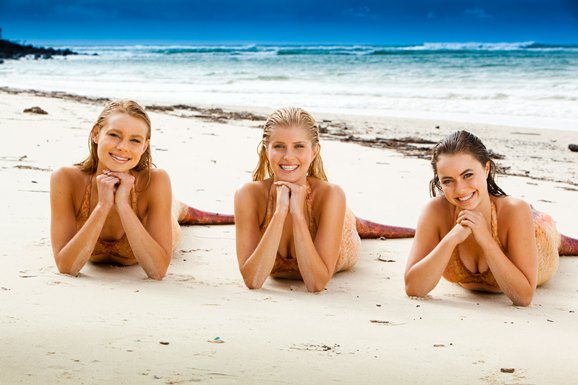'Mako Mermaids' (photo courtesy of Jonathan M. Shiff Productions).
The Australian Greens have launched a campaign to support local children’s television, arguing the government should strengthen the requirements on commercial broadcasters to produce and air such content.
Launched yesterday, the #SaveKidsTV campaign has been backed by Screen Producers Australia and the Media, Entertainment & Arts Alliance (MEAA).
The Greens’ arts and youth spokesperson, Senator Sarah Hanson-Young, said Aussie children’s television was “in a fight for its life”.
“Children’s television has played a crucial role in our country and the development of young Australians for generations, but the media landscape is undoubtedly shifting.”
“New players like Netflix and Stan have changed the way that all of us, including young people, consume media and they can't be allowed to leave children’s TV behind.”
“In an ever-connected and global world, our children need safe places where they can see their own world reflected back to help them make sense of it. Every culture needs to tell their own stories for learning and reflection. Quality children’s TV is one way of helping our kids to make sense of what it means to be Australian and how we connect with each other and those beyond our borders.”
Commercial free-to-air broadcasters are required to air 260 hours of C classified programs a year (designated for children under 14 years of age), and 130 hours of programs with P classification (for preschool aged children) from any source.
Within a three year period, commercial broadcasters are required to air at least 96 hours of first-release Australian C drama, and a minimum of 25 hours per year. Quota hours can be deferred through an accrual scheme and if an independent producer fails to provide an agreed program.
In submissions to the recent House of Reps inquiry into film and television, commercial broadcasters argued for a review of the local content quotas, particularly children’s.
Senator Hanson-Young said the commercial channels were trying to get out of their obligations to make children’s programming because it couldn’t compete for ratings in the same vein as reality programs such as Masterchef and Married at First Sight.
“The Greens will be moving in the Senate to support children’s television in Australia and strengthen the requirements for our broadcasters.”
Screen Producers Australia CEO Matt Deaner expressed strong support for the campaign, arguing that shows like Lockie Leonard, Mako Mermaids, Beat Bugs and Dance Academy were a result of the obligations placed on commercial networks, as well as well-funded public broadcasting.
“Removing these obligations on commercial broadcasters, together with any withdrawal of support from the public broadcasters, will mean Australian children’s content just won’t get made. Australian children deserve access to high-quality Australian stories that are targeted to their different stages of development,” he said.
“The answer isn’t devolution, it’s evolution. We can’t leave the responsibilities to children’s programming to the public broadcasters. It takes a village to raise a child. We need to evolve the regulatory environment to reflect the current market and include obligations on SVOD services like Netflix and Amazon.”
“The UK reduced children’s obligations on commercial broadcasters in 2003. That led to a 93 per cent decline in the industry. This month, the UK Government admitted it made a mistake and is reintroducing their obligations. The Australian Government doesn’t have the same luxury to make a mistake now and fix it later because if the content quotas are removed, they can’t be brought back because of our free trade agreement with the United States.”
The MEAA has similarly welcomed the Greens’ campaign, arguing that the drama quota for commercial broadcasters needed to be maintained, and introduced for SVOD platforms.
The union also called for a study into whether a cap is required on animation in order to preserve live-action drama as a proportion of the commercial networks’ obligations.
“The content quotas currently in place ensure that commercial free-to-air broadcasters are continually commissioning high budget local children’s drama programs and providing significant finance for the production of those series,” said MEAA CEO Paul Murphy.
“It goes without saying that we want children to see their own culture reflected on screen through Australian stories. The last thing we want is for our kids in their developmental years to be exposed to a uniform diet of American and British accents. And research shows that Australian kids prefer content made for them.”
“Nor should the provision of children’s live action programming be confined to the public broadcasters. Without enforceable quotas, it seems very clear that the media marketplace would jettison plans to produce quality children’s drama in a heartbeat.”


